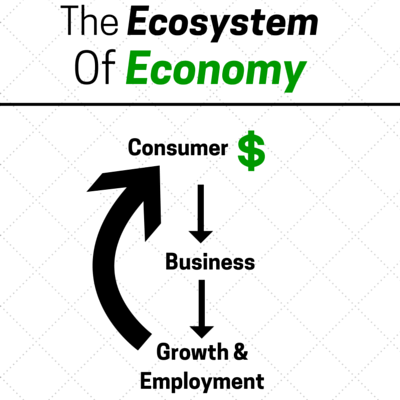
By Sarah Sanders
The basic economy works the same wherever you go: People spend money. The businesses that receive that revenue can expand and employ more people. Those newly-employed people then have more money to spend back into that economy, which further builds these businesses and continues the circle.
The question is: Which economy are we choosing to build? We have two choices: Circulate that money and growth inside or outside of our communities.
Circulating our business locally means more people will be employed in our communities. It means local businesses will be less fearful of expanding, and new business ventures may form as a result of the positive environment for growth. This can then impact the national economy as communities expand and support each other.
Ignoring local businesses, and sending our money solely to a national or international business, breaks that chain of growth and supports the monopoly of big businesses that can potentially minimize local growth and leave our communities stagnant. This gives people in other states or other countries the employment and economic growth that we should be seeing in our local area, and leaves our nation with a broken network of failing cities and economies.
For example, the Edmonton Social Planning Council said that the trend of the local economy was not looking too good in Edmonton, Alberta, Canada, at the end of last year, Canadian publication CBC News reported. The council, which releases a Tracking the Trends report every two years, concluded:
- The number of Edmontonians receiving employment insurance benefits was up 55 percent in the first eight months of 2015, compared to the year before;
- The number of Edmonton households receiving social assistance benefits was up 9.1 percent in the first nine months of 2015, compared to the 2014 average;
- 14,794 people were served by Edmonton's Food Bank in March 2015, an increase of 15.4 percent compared to a year earlier;
- 128,810 people in metro Edmonton lived in poverty in 2013, 10.5 percent of the population.
The nation cannot grow and succeed if the communities within are struggling. In an emergency on an airplane, you are told to always put on your own oxygen mask first, before you help those around you. If you can’t even survive yourself, you can’t expect to help anybody else. This holds true as well with local and national economies.
You cannot work backward. By supporting local business, we keep our communities from starving economically, and we support new ideas and local business decisions. Our local businessmen and businesswomen know what works and what is needed in our community. Giving our support to them is crucial to encouraging diversity and new ideas that can then spread to a national level when they are ready to grow.
Keep our communities alive and thriving, and give people a chance to work and support each other. Support local economies.
Graphic courtesy of the author.
Sarah Sanders is a full-time student, wife, and soon-to-be mother. She is a representative for garage storage and organization companies local to Edmonton, AB called Wicked Workshops Inc. and Inline Solutions, who support local businesses and the local economy.
TriplePundit has published articles from over 1000 contributors. If you'd like to be a guest author, please get in touch!














